From Syria to Sweden: Eiad´s perilous voyage across the Mediterranean
Eiad’s wife did not want him to embark on the perilous journey across the Mediterranean Sea to safety in Europe, but Eiad believed it was their only option. They had tried to build a new life in Egypt, but after two years in the country, Eiad realized he would not be able to provide a good future for his young children there. “Life wasn’t very good in Egypt”, he explains. In spite of his wife’s protests, Eiad decided to risk his life in a rickety boat sailing from Egypt to Italy. His wife and children returned to Damascus. “I was more worried about the kids”, he says. “I thought that if my life will finish, it will finish anyway – in Egypt, in the sea, wherever.”
After one and a half months of searching, he made contact with a human smuggler. The price for getting to Europe: 2,500 dollars. “We went in a group so it would be cheaper. The safest way to travel to Europe is through Turkey but it’s much more expensive. Sometimes, it can cost more than 8000 dollars per person” says Eiad. He describes the five-day boat journey to Italy with more than 300 others as “hell”- people were thrown into the boat and the smugglers did not care if they fell into the water. “If they had animals with them, they would take better care of them because they’re worth more to them”, says Eiad. Still, there was a sense of solidarity between passengers. Eiad recalls how two people almost fell off the boat in their sleep but were caught by the other passengers.
After reaching the shores of Italy, Eiad headed towards Northern Europe and arrived in Sweden on 12 October 2014. Coming here was a great relief, but life as a refugee has its daily struggles. “I miss my family” says Eiad, explaining how he had to adjust to his new life at the asylum-seeker reception centre in Farsta, Stockholm. “Starting over is not easy and leaving your country without your family… it’s hard. A lot of people who came here didn’t want to leave their lives behind in Syria. But it is impossible to give them back the same life here…They are forced to change” he says sadly.
For 36-year-old Eiad, a former shop and restaurant owner, living a slower paced life at the reception centre is a challenge. He often plays cards with some of the other people at the centre to make time pass faster and sometimes he also plays football. “But I have a problem with my back so I can’t do too much sport.” He believes life moves slower in Sweden. “In Syria, we do everything fast. A lot of Arabs find this very frustrating because we are always in a hurry” says Eiad with a laugh,
“We want things to happen faster, and we want to be reunited with our families sooner.”
Eiad says he has not started his life in Sweden yet, not without his family. “Your mind is not clear, it’s with your family, your kids, and you’re waiting to see them.” But despite the continuing concerns for his family, Eiad is hopeful for the future. “I want to finish my studies or work and study at the same time. I don’t like to sit still.” He hopes to use the skills he acquired as a restaurant owner in Syria to start a small restaurant in Sweden, serving Syrian food.
Eiad’s application for asylum has just been approved and he is waiting to be reunited with his wife and two sons, who are still in Syria. “My children are very excited about coming to Sweden”, says Eiad with a big smile. “My wife is worried because she doesn’t know anyone here and it’s strange for her. But I think she’s going to like it. She is an English teacher” he says proudly.
Page 24 of 33
-

Corona causes anxiety – also for refugees
15.02.2021The global corona pandemic leaves its mark on the lives of refugees in Estonia. UNHCR investigated how they cope with the crisis.
-

Stories from the Field: “The pandemic is much more than a health issue”
09.02.2021 -

UNHCR congratulates Jonava on joining the Council of Europe’s network of “Intercultural Cities”
28.01.2021UNHCR, the UN Refugee Agency, welcomes Jonava’s membership of the Council of Europe’s Intercultural Cities Programme. Jonava is not only the first Lithuanian but also the first Baltic city to join the network. The CoE Intercultural Cities network provides expertise and support to cities to exchange experiences on how to […]
-
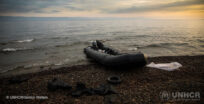
UNHCR warns asylum under attack at Europe’s borders, urges end to pushbacks and violence against refugees
28.01.2021Alarmed at the increasing frequency of expulsions and pushbacks of refugees and asylum-seekers at Europe’s land and sea borders, UNHCR, the UN Refugee Agency, is calling for states to investigate and halt these practices. “UNHCR has received a continuous stream of reports of some European states restricting access to asylum, […]
-

UNHCR calls for EU to ensure a new chapter for refugee protection
12.01.2021UNHCR’s recommendations to the EU Presidencies in 2021.
-
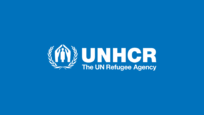
Recommendations to Denmark on strengthening refugee protection
11.01.2021UNHCR’s Representation for the Nordic and Baltic Countries has developed a set of recommendations on strengthening refugee protection at the national, European and global level.
-
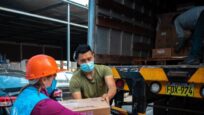
Solidarity in action: One year on from the Global Refugee Forum
17.12.2020At the end of 2019, the energy and optimism of the first Global Refugee Forum created an atmosphere of anticipation for the years ahead. Expectations were high to mobilize action towards the objectives of the Global Compact on Refugees and the fulfilment of the 1,400 pledges made at the Forum. […]
-
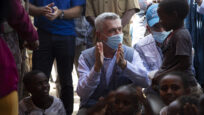
UNHCR’s 70th anniversary is no cause for celebration
14.12.2020On 14 December, the Office of the United Nations High Commissioner for Refugees will be 70 years old. For an organization that should have ceased to exist after three years, it is an uncomfortable birthday that we are not in the mood to celebrate. As a shattered world started to […]
-
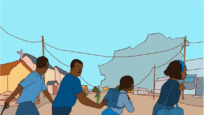
UNHCR launches Danish teaching material on refugees
07.12.2020In close collaboration with the Danish publisher Alinea, UNHCR has developed a new, free educational course for schools in order to provide young people with knowledge and insight into an important yet complex topic.
-
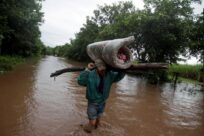
How climate change is multiplying risks for displacement
03.12.2020Global heating is compounding threats for people already living with conflict and insecurity, further driving displacement around the world.
